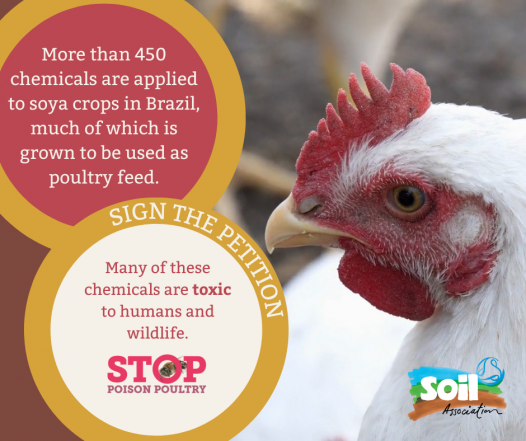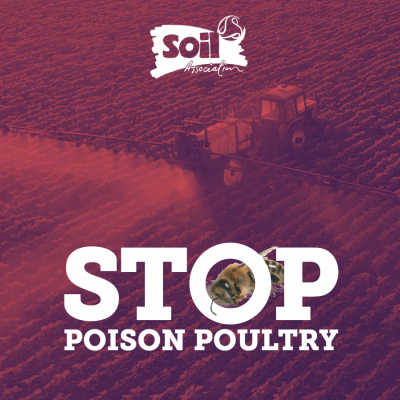This week the Soil Association has launched a new campaign, Stop Poison Poultry. The campaign exposes the use of highly hazardous pesticides in supermarket soy supply chains for chicken feed. People are being asked to sign a petition calling on the UK’s top 10 supermarkets to end the use of these pesticides, dangerous products which are causing devastating pollution harming humans and wildlife across Brazil.
Chicken is the UK’s most popular meat, with many people seeing it as being less environmentally harmful than beef and lamb. As outlined in Eating Better’s “We Need to Talk About Chicken” report, however, this assumption ignores the impact of chicken feed grown overseas.
Every year, the UK imports more than one million tonnes of soy from Brazil to feed the one billion chickens we produce each year in this country, primarily in industrial chicken units or factory farms. In response to global demand for intensively farmed meat, Brazil has become the epicentre of soy production, with large swathes of the Amazon and Cerrado, a hugely important tropical savannah, destroyed for the crop.
There is increasing attention on the impact of deforestation and land conversion resulting from soy production, with commitments made at the Climate COP last year to end deforestation and land degradation by 2030. Retailers and other stakeholders have also signed the UK Soy Manifesto, an industry commitment to ensure that physical shipments of soy into the UK are deforestation and land conversion-free by 2025 at the latest.

But soy production doesn’t only cause the physical destruction of forests and tropical grasslands. It also relies on huge volumes of pesticides. As soy production in Brazil has increased sixfold in the last few decades, pesticide use has risen by 900%, with many products used there banned for use in the UK and Europe, including neonicotinoids, which have devastating impacts on bees. Significant declines in Brazilian bee populations have been reported in recent years, including the deaths of more than one billion bees between 2013 and 2017. Hundreds of rare and endangered bird species are at risk of pesticide poisoning in ecosystems across Brazil, as well as fish, frogs and mammals such as bats and tapirs. Human populations face 70,000 pesticide-related poisonings a year in the country.
The Soil Association is also asking supermarkets to scale up alternative feeds to soy, reducing reliance on the crop. And UK governments are being asked to phase out industrial chicken from public canteens and introduce a moratorium on the construction of any new intensive poultry units, as well as more support for organic, all in line with Eating Better’s less and better meat transition.
